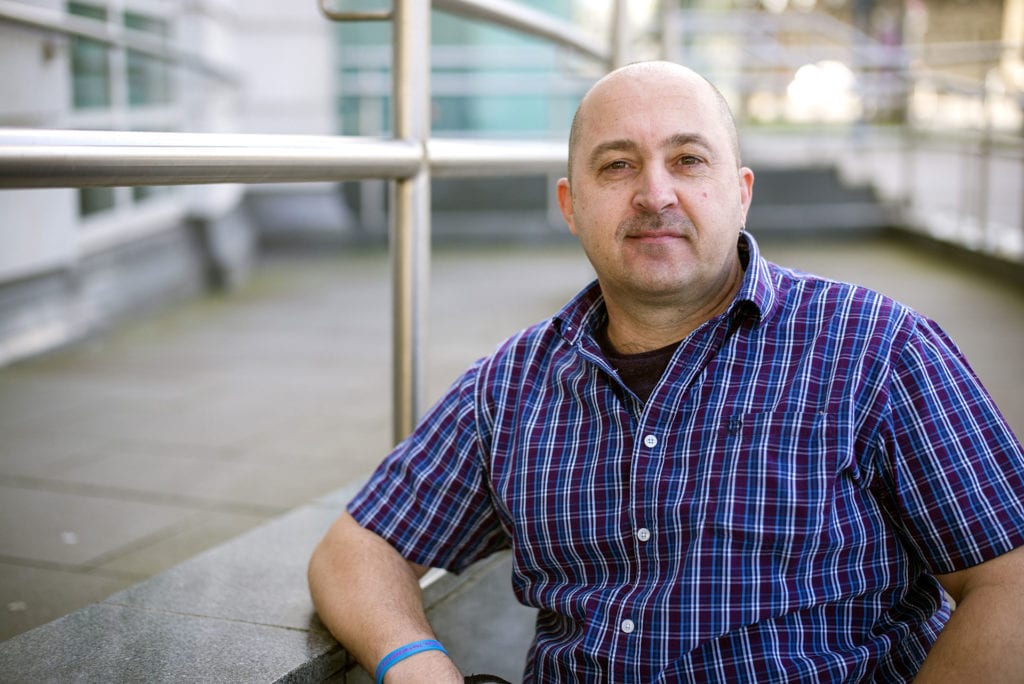My name is Alan. I cross many borders as a person with a rare disease. These borders are physical, geographical and psychological.
Crossing so many borders has earned me the name rare disease warrior and also the hashtag #AlanEveryWhere. That “lucky” rare disease is ataxia.
So what is ‘Ataxia’? A Greek word meaning ‘lack of order’.
People with ataxia have problems with movement, balance, and speech. It is a neuro-“degenerative” “life-limiting” condition and has NO cure. Being accused of being drunk is a common occurrence, although on a weekend evening, this may be hard to distinguish, between genuine and “self inflicted” issues.
From an early age, I have always walked with a wobble and sounded a bit slurred. Many people just thought, “Oh that’s just Alan!”.
I achieved good qualifications at school and went on to run my own electrical contracting business, but the condition slowly progressed. Lack of coordination and electrical circuitry do NOT mix.
I managed to carry on– that is, until the day when, while making sandwiches for work, I found that buttering bread seemed to take more and more concentration. It’s a simple task you take for granted. That was when I thought about looking into this. I thought it may have a simple answer (how wrong was I?).
I went to my general physician, who, on numerous occasions told me to take time off work and rest. This went on for many years. On one visit, my GP was not available, so I saw a locum (who had recent knowledge of similar conditions/symptoms). He asked for more neurological tests and referred me to a general neurologist, where I was diagnosed with Cerebellar Ataxia. I was told the diagnosis, the probable outcome, that there was nothing that could be done, and “that was that”.
I returned to my GP, who said that I had a rare condition. He said it was unlikely I would meet many others with this rare disease. Upon returning home, I tried researching ataxia via the internet but at the time, found there wasn’t a large amount of consistent information available (along with some good and bad stories).
Since this lack of information is common for many rare diseases, I am determined that information should be available to patients with all rare diseases. A support network is also vital, so the feeling of not being alone does NOT add to the patients worries.
I see a general neurologist in a local hospital, but their knowledge of ataxia is very limited (and I find myself telling them about it!) and I have to travel to Royal Hallamshire Hospital in Sheffield, UK, to attend a specialist ataxia clinic. This requires a journey of 257.84 miles, nearly 5 hours by train!
Many of the issues surrounding ataxia can be recognised by people with other conditions, such as overlapping symptoms, misdiagnosis, support needed today and everyday. In addition, the Chief Medical Officer, in the home, is the patient or family member or carer.
 This led me to establish “Ataxia and Me” to share the patient experience to a wider arena. “Ataxia and Me” is a patient led patient group based in Wales with a global following. The focus of the group is ataxia but it also encompasses associated rare diseases and movement disorders.
This led me to establish “Ataxia and Me” to share the patient experience to a wider arena. “Ataxia and Me” is a patient led patient group based in Wales with a global following. The focus of the group is ataxia but it also encompasses associated rare diseases and movement disorders.
I am determined to make information, awareness, and knowledge available to patients with all rare diseases and to provide a support network. Support is important to reduce patient worries and to ensure that no one feels alone.
Something I am also keen to see change is the “uniformity” of services available to patients with a neurological condition. For example, the services offered to a younger patient seem to cease when they transfer into adulthood. This is a very worrying situation.
There are between 6,000 and 8,000 known rare diseases, and around five new rare diseases are described in medical literature each week. 1 in 17 people, or 7% will be affected by a rare disease at some point in their lives. This equates to approximately 3.5 million people in the UK. If all of the people with a rare disease lived in one country, it would be the world’s 3rd most populous country.
Rare Disease Day is on the last day of February. This year, the 28th, although on a LEAP year this will be the 29th, a very “Rare Day”.
In Wales, our rare disease day Parliamentary reception was on the 14th of February (Valentine’s day) so it’s fine to “love your rare disease”, we are all in this together!
You can follow Alan’s group via www.ataxiaandme.org and via social media: Facebook @ataxiaandme, Twitter @ataxiaandme Instagram @ataxia_and_me





